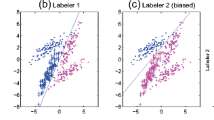Abstract
Filtering low-quality workers from data sets labeled via crowdsourcing is often necessary due to the presence of low quality workers, who either lack knowledge on corresponding subjects and thus contribute many incorrect labels to the data set, or intentionally label quickly and imprecisely in order to produce more labels in a short time period. We present two new filtering algorithms to remove low-quality workers, called Cluster Filtering (CF) and Dynamic Classification Filtering (DCF). Both methods can use any number of characteristics of workers as attributes for learning. CF separates workers using k-means clustering with 2 centroids, separating the workers into a high-quality cluster and a low-quality cluster. DCF uses a classifier of any kind to perform learning. It builds a model from a set of workers from other crowdsourced data sets and classifies the workers in the data set to filter. In theory, DCF can be trained to remove any proportion of the lowest-quality workers. We compare the performance of DCF with two other filtering algorithms, one by Raykar and Yu (RY), and one by Ipeirotis et al. (IPW). Our results show that CF, the second-best filter, performs modestly but effectively, and that DCF, the best filter, performs much better than RY and IPW on average and on the majority of crowdsourced data sets.
Access this chapter
Tax calculation will be finalised at checkout
Purchases are for personal use only
Similar content being viewed by others
References
Alonso, O., Mizzaro, S.: Can we get rid of trec assessors? using mechanical turk for relevance assessment. In: Proceedings of the SIGIR 2009 Workshop on the Future of IR Evaluation, vol. 15, p. 16 (2009)
Brabham, D.C.: Crowdsourcing as a model for problem solving an introduction and cases. Convergence: Int. J. Res. New Media Technol. 14(1), 75–90 (2008)
Dawid, A.P., Skene, A.M.: Maximum likelihood estimation of observer error-rates using the em algorithm. Appl. Stat. 28, 20–28 (1979)
Difallah, D.E., Demartini, G., Cudre-Mauroux, P.: Mechanical cheat: spamming schemes and adversarial techniques on crowdsourcing platforms. In: CrowdSearch, pp. 26–30 (2012)
Downs, J.S., Holbrook, M.B., Sheng, S., Cranor, L.F.: Are your participants gaming the system?: screening mechanical turk workers. In: Proceedings of the SIGCHI Conference on Human Factors in Computing Systems, pp. 2399–2402. ACM (2010)
Hall, M., Frank, E., Holmes, G., Pfahringer, B., Reutemann, P., Witten, I.H.: The weka data mining software: an update. ACM SIGKDD Explor. Newsl. 11(1), 10–18 (2009)
Howe, J.: The rise of crowdsourcing. Wired Mag. 14(6), 1–4 (2006)
Ipeirotis, P.G., Provost, F., Wang, J.: Quality management on amazon mechanical turk. In: Proceedings of the ACM SIGKDD workshop on human computation, pp. 64–67. ACM (2010)
Raykar, V.C., Yu, S.: Ranking annotators for crowdsourced labeling tasks. In: Advances in neural information processing systems, pp. 1809–1817 (2011)
Ribeiro, F., Florencio, D., Nascimento, V.: Crowdsourcing subjective image quality evaluation. In: 2011 18th IEEE International Conference on Image Processing (ICIP), pp. 3097–3100. IEEE (2011)
Sheng, V.S., Provost, F., Ipeirotis, P.G.: Get another label? improving data quality and data mining using multiple, noisy labelers. In: Proceedings of the 14th ACM SIGKDD International Conference on Knowledge Discovery and Data Mining, pp. 614–622. ACM (2008)
Venetis, P., Garcia-Molina, H.: Quality control for comparison microtasks. In: Proceedings of the First International Workshop on Crowdsourcing and Data Mining, pp. 15–21. ACM (2012)
Zaidan, O.F., Callison-Burch, C.: Crowdsourcing translation: professional quality from non-professionals. In: Proceedings of the 49th Annual Meeting of the Association for Computational Linguistics: Human Language Technologies, vol. 1, pp. 1220–1229. Association for Computational Linguistics (2011)
Zook, M., Graham, M., Shelton, T., Gorman, S.: Volunteered geographic information and crowdsourcing disaster relief: a case study of the haitian earthquake. World Med. Health Policy 2(2), 7–33 (2010)
Author information
Authors and Affiliations
Corresponding author
Editor information
Editors and Affiliations
Rights and permissions
Copyright information
© 2015 Springer International Publishing Switzerland
About this paper
Cite this paper
Nicholson, B., Sheng, V.S., Zhang, J., Wang, Z., Xian, X. (2015). Improving Label Accuracy by Filtering Low-Quality Workers in Crowdsourcing. In: Sidorov, G., Galicia-Haro, S. (eds) Advances in Artificial Intelligence and Soft Computing. MICAI 2015. Lecture Notes in Computer Science(), vol 9413. Springer, Cham. https://doi.org/10.1007/978-3-319-27060-9_45
Download citation
DOI: https://doi.org/10.1007/978-3-319-27060-9_45
Published:
Publisher Name: Springer, Cham
Print ISBN: 978-3-319-27059-3
Online ISBN: 978-3-319-27060-9
eBook Packages: Computer ScienceComputer Science (R0)




